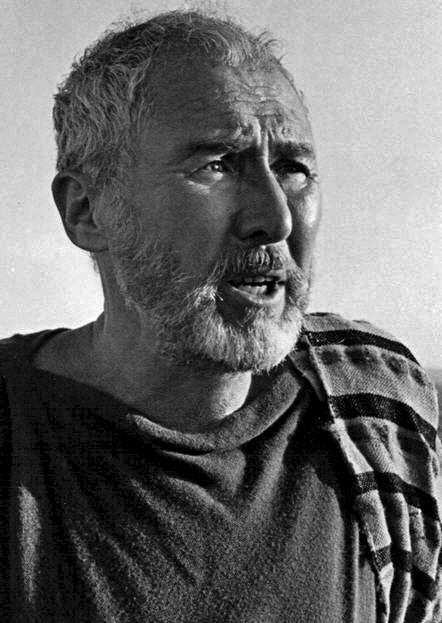
Anthony Quayle
Sir John Anthony Quayle CBE (7 September 1913 – 20 October 1989) was a British actor, theatre director and novelist. He was nominated for an Oscar and a Golden Globe for his supporting role as Thomas Wolsey in the film Anne of the Thousand Days (1969). He also played important roles in such major studio productions as The Guns of Navarone (1961), Lawrence of Arabia (1962), The Fall of the Roman Empire (1964), Operation Crossbow (1965), QB VII (1974) and The Eagle Has Landed (1976). Quayle was knighted in the 1985 New Years Honours List.
Anthony Quayle
Early life[edit]
Quayle was born on 7 September 1913 at 2 Delamere Road, Ainsdale,[1] Southport, Lancashire, to solicitor Arthur Quayle, of a Manx family, and Esther Kate Quayle (née Overton).[3]
He was educated at Abberley Hall School, a preparatory school in Abberley, Worcestershire, and at Rugby School, then an all-boys independent boarding school. He trained for one year at the Royal Academy of Dramatic Art (RADA) in London. His first professional stage appearance was in The Ghost Train at the Q Theatre, while on holiday from RADA. After appearing in music hall, he joined the Old Vic in 1932.[3]
Second World War service[edit]
During the Second World War, he served in the Royal Artillery, British Army.[3] Having joined as a gunner (i.e. private), he attended the 70th Coast Defence Training Regiment and was commissioned as a second lieutenant on 7 January 1940.[4] He was made one of the area commanders of the Auxiliary Units in Northumberland.[5][6]
Later he joined the Special Operations Executive (SOE) and served as a liaison officer with the partisans in Albania. Reportedly, his service with the SOE seriously affected him, and he never felt comfortable talking about it. He described his experiences in a fictional form in Eight Hours from England.[7]
He was an aide to the Governor of Gibraltar at the time of the air crash of General Władysław Sikorski's aircraft on 4 July 1943.[8] He wrote of his Gibraltar experience in his second novel On Such a Night, published by Heinemann.
By the end of the war, he held the rank of temporary major.[9] In May 1946, it was published that he had been mentioned in despatches "in recognition of gallant and distinguished services in the Mediterranean Theatre".[9]
Career[edit]
Theatre[edit]
From 1948 to 1956 Quayle directed at the Shakespeare Memorial Theatre, and laid the foundations for the creation of the Royal Shakespeare Company. His own Shakespearian roles included Falstaff, Othello, Benedick in Much Ado About Nothing, Henry VIII and Aaron in Titus Andronicus with Laurence Olivier; he played Mosca in Ben Jonson's Volpone; and he also appeared in contemporary plays. He played the role of Moses in Christopher Fry's play The Firstborn, in a production starring opposite Katharine Cornell.[10] He also made an LP with Cornell, in which he played the role of poet Robert Browning in The Barretts of Wimpole Street.[11]
Quayle made his Broadway debut in The Country Wife in 1936. Thirty-four years later, he won critical acclaim for his starring role in the highly successful Anthony Shaffer play Sleuth, which earned him a Drama Desk Award.
Quayle played James Tyrone in the first UK production of Eugene O'Neill's Long Day's Journey Into Night (Globe Theatre, London, 1958).[12]
Quayle was artist-in-residence at the University of Tennessee in the mid-70s. He came to Knoxville in spring 1974, through a partnership with the Kennedy Center, starring in Henry Denker's The Headhunters, which rehearsed and opened at the Clarence Brown Theatre and then moved on to the Kennedy Center's Eisenhower Theatre. Quayle was appointed as professor in theatre in 1974. He taught classes as an artist in residence and served as artistic director of the Clarence Brown Company—a professional theatre company in residence at UT. He played in Everyman the same year.
In 1984, he founded Compass Theatre Company, that he inaugurated with a tour of The Clandestine Marriage, directing and playing the part of Lord Ogleby. This production had a run at the Albery Theatre, London. With the same company he subsequently toured with a number of other plays, including Saint Joan, Dandy Dick and King Lear with himself in the title role.
Personal life[edit]
Quayle married twice. His first wife was the actress Hermione Hannen (1913–1983), to whom he was married from 1935 to 1941. In 1947, he married American-born actress Dorothy Hyson (1914–1996), known as "Dot" to family and friends.[8] He and Dorothy had two daughters, Jenny and Rosanna, and a son, Christopher.
Quayle died at his home in Chelsea from liver cancer on 20 October 1989.[13]
Quayle was mentioned in despatches during the Second World War.[9] He was appointed a Commander of the Order of the British Empire (CBE) in the 1952 Birthday Honours.[14] He was appointed a Knight Bachelor in the 1985 New Year Honours for services to the Theatre,[15] and knighted by Queen Elizabeth II during a ceremony at Buckingham Palace on 5 March 1985.[16]
Quayle authored two novels and an autobiography.
The first novel is a semi-fictional account of his war service with the S.O.E. in Albania.